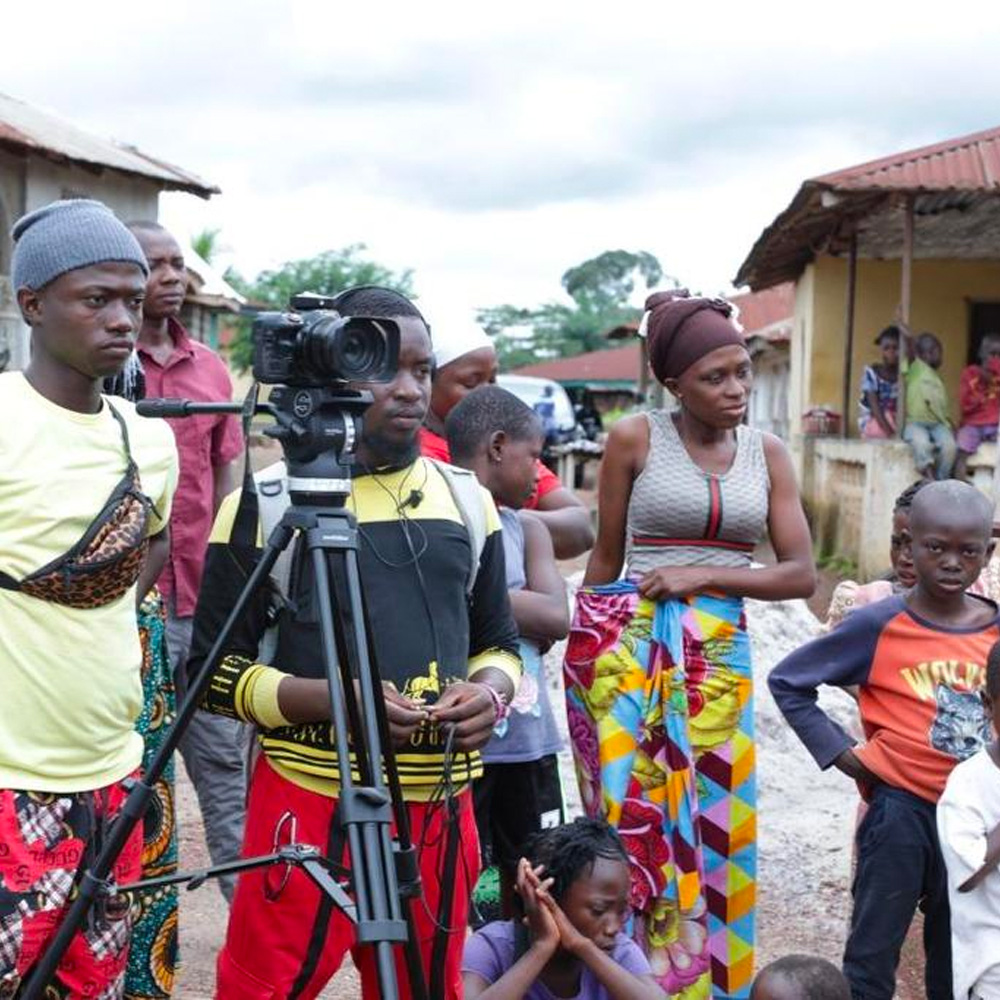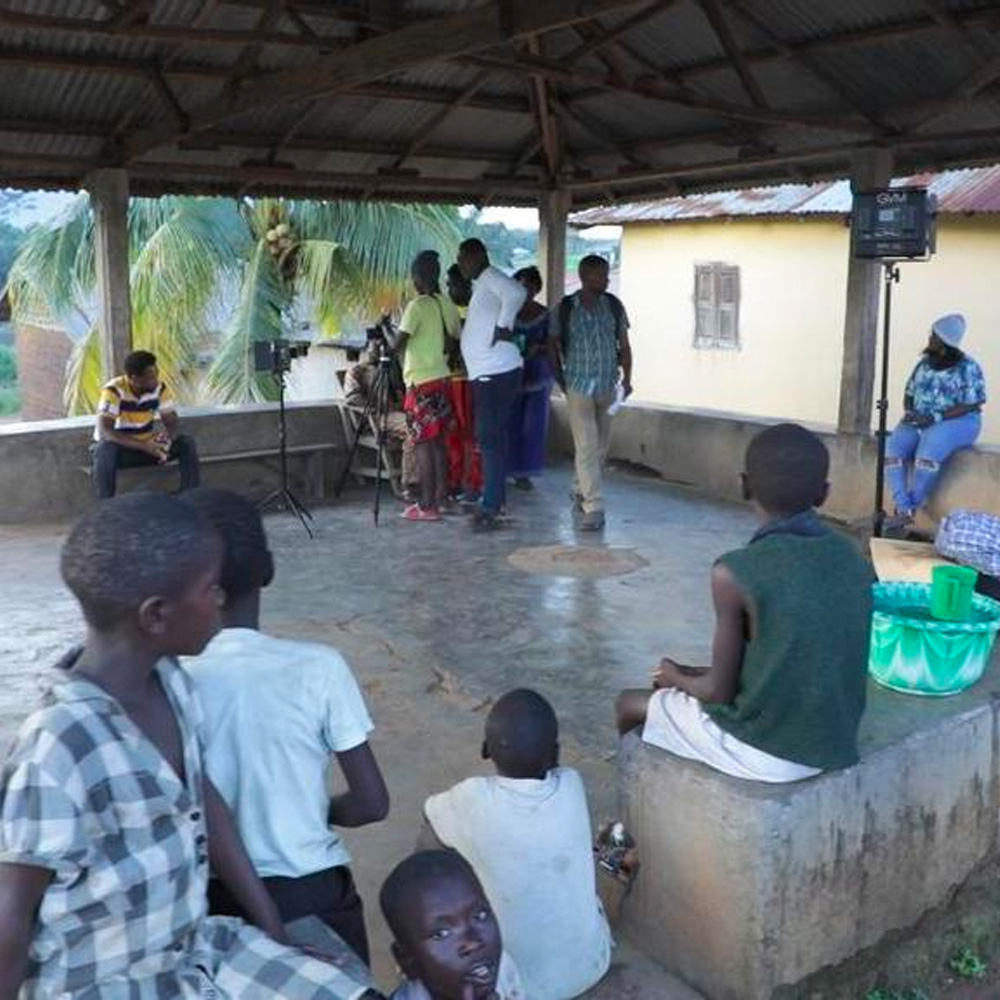COME, I’LL SHOW YOU
ILLEGAL TRADITIONS
Abu, the privileged son of the local chief, returns to his home village after his studies to work for an international corporation that is the main employer there. His childhood best friend, Karimu, had no chance of a good education and therefore no job.
 
Abu tries everything to get the company to hire Karimu and the village youth. But it’s not that easy, because without training there are no jobs, but without jobs there is no money for training either. Abu faces a dilemma. Against all odds, he begins to devise an elaborate plan to fulfil his promise that he will provide work.
 
In case your browser doesn’t allow the video to be automatically available, please click here to be re-directed to YouTube: LAN WOKE
COME, I’LL SHOW YOU
ILLEGAL TRADITIONS
Abu, the privileged son of the local chief, returns to his home village after his studies to work for an international corporation that is the main employer there. His childhood best friend, Karimu, had no chance of a good education and therefore no job.
 
Abu tries everything to get the company to hire Karimu and the village youth. But it’s not that easy, because without training there are no jobs, but without jobs there is no money for training either. Abu faces a dilemma. Against all odds, he begins to devise an elaborate plan to fulfil his promise that he will provide work.
 
In case your browser doesn’t allow the video to be automatically available, please click here to be re-directed to YouTube: LAN WOKE

COME, I’LL SHOW YOU THE
FILMMAKERS
| Screenplay |
Suleman C. Jabaty |
| Director |
Zachariah Kamara |
| Director of Photography |
Dauda Kamara |
| Editor |
Mohamed Tarawally |
| Sound |
Mohamed A. Kamara |
|
Light + Still Photography |
Bockarie Abu |
| Costumes |
Ibrahim Rahman |
| Continuity |
Zion B. Kamara |
| Production Manager |
Hawa J. Baion |
| Production Assistant |
Sidie Koroma |
| Location Management |
Stallin Bockarie Koroma |
| Welfare |
Mariama Jalloh |
COME, I’LL SHOW YOU THE
FILMMAKERS
Screenplay
Suleman C. Jabaty
Director
Zachariah Kamara
Director of Photography
Dauda Kamara
Editor
Mohamed Tarawally
Sound
Mohamed A. Kamara
Light + Still Photography
Bockarie Abu
Costumes
Ibrahim Rahman
Continuity
Zion B. Kamara
Production Manager
Hawa J. Baion
Production Assistant
Sidie Koroma
Location Management
Stallin Bockarie Koroma
Welfare
Mariama Jalloh

COME, I’LL SHOW YOU THE
FILM INFORMATION
| Length | Fiction |
| Length | 22:45 min. |
| Language |
Mende, Krio, English with English subtitles |
| Country of origin | Sierra Leone |
| Year | 2021 |

COME, I’LL SHOW YOU THE
FILM INFORMATION
Length
Fiction
Length
22:45 min.
Language
Mende, Krio, English with English subtitles
Country of origin
Sierra Leone
Year
2021
COME, I’LL SHOW YOU THE COUNTRY OF ORIGIN
SIERRA LEONE
Sierra Leone (officially the Republic of Sierra Leone) borders Guinea in the north and Liberia in the southeast. Freetown is the country’s capital and economic centre. English is the official language of this former British colony, but most people speak Krio.
>/br>
Over a thousand schools were destroyed during the civil war that lasted from 1991 to 2002. Following the Ebola epidemic (2014-2016), the country is now working to rebuild state and social infrastructure. Both Sierra Leone’s constitution and the 2004 Education Act mandate nine years of compulsory basic education, but full compliance is not possible due to a lack of schools and teachers. The literacy rate of the adult population in 2015 was 48.1% (women: 37.7%, men: 58.7%).
>/br>
Sierra Leone has a great variety of media. After a long debate, 2013 saw the passing of a freedom of information law. Sierra Leone ranked 85th out of 180 countries on the 2020 World Press Freedom Index, published by Reporters without Borders.
COME, I’LL SHOW YOU THE COUNTRY OF ORIGIN
SIERRA LEONE
Sierra Leone (officially the Republic of Sierra Leone) borders Guinea in the north and Liberia in the southeast. Freetown is the country’s capital and economic centre. English is the official language of this former British colony, but most people speak Krio.
>/br>
Over a thousand schools were destroyed during the civil war that lasted from 1991 to 2002. Following the Ebola epidemic (2014-2016), the country is now working to rebuild state and social infrastructure. Both Sierra Leone’s constitution and the 2004 Education Act mandate nine years of compulsory basic education, but full compliance is not possible due to a lack of schools and teachers. The literacy rate of the adult population in 2015 was 48.1% (women: 37.7%, men: 58.7%).
>/br>
Sierra Leone has a great variety of media. After a long debate, 2013 saw the passing of a freedom of information law. Sierra Leone ranked 85th out of 180 countries on the 2020 World Press Freedom Index, published by Reporters without Borders.

